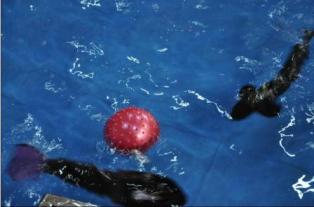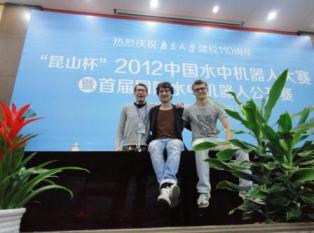RUG team takes 1st place in international robotic fish competition

From May 18 through 20 a three-person team from the University of Groningen participated in the IFUR robotic fish water-polo competition in Nanjing, China. The team performed very well in the creative competition. With their collaboration strategy based on the wolf pack hunting strategy, they won the first place in this discipline. The IFUR competition is an annual international tournament for university students. This year 25 university teams participated in 14 disciplines.

Control strategy for robotic fish
The Groningen team members, Ömer Arslan, Ruben Zwetsloot and Rutger Kamps, are all Industrial Engineering and Management students. They worked on a control strategy for the robotic fish in the context of their Bachelor thesis, specialized in the Discrete Technology and Production Automation (DTPA) research group.
Circle dribbling
The RUG-team participated in four disciplines: 1vs1 water polo , ‘ circle dribbling ‘, ‘obstacle avoidance’, and the creative round. In the 1vs1 water polo discipline two teams with one robotic fish try to score goals using a floating ball in the pool. In ‘ circle dribbling ‘ the goal is to make one fish push the ball around an obstacle, which is located in the middle of the pool. In ‘obstacle avoidance’, the objective is to retrieve the ball with one fish, by swimming around the obstacles, and then bring the ball back to the starting point. In both disciplines, the winner is the team who completes this task the fastest. In the creative competition, teams present their own innovative marine robotics research. A jury assesses the team performance.
More news
-
19 December 2025
Mariano Méndez receives Argentine RAÍCES award
-
18 December 2025
Why innovate, and for whom?
-
17 December 2025
Ben Feringa wins Feynman Prize
